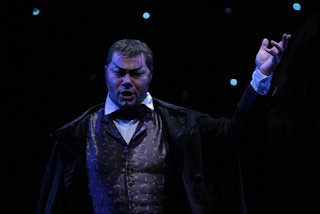 |
| Did somebody say...SATAN? René Pape looking devilish. |
This fine recital disc from German bass René Pape is a kind of abbreviated capsule of his career in the last 15 years. Mr. Pape first rose to prominence at Bayreuth, singing the role of Fasolt in a production of
Das Rheingold that is more remembered for its hideous costumes than its singing. Since then, he has built an international reputation as a bass with a fine, rich voice, capable of singing the heavy Wagner bass roles as well as the various operatic portrayals of the Devil.
First the demonic. The disc opens with Mr. Pape essaying the role of Mephistopheles in three different operas. Two excerpts from Gounod's Faust, one from Boito's Mefistofele and an aria from Berlioz'
Le Damnation de Faust. Mr. Pape uses his warm bass-baritone instrument to convey the power of evil and the devil's ability to repeatedly seduce Faust and win his immortal soul in each of these operas.
The set includes two excerpts from
The Demon, a rarely heard Russian opera from the pen of Anton Rubinstein. These performances make a case to return Rubinstein's neglected work to the repertory. Based on a poem by Lermontov, this Russian work allows Mr. Pape the chance to display another side of his versatile instrument and skill in the Russian repertoire.
Another highlight is Mr. Pape's first recording as Wotan. The
Rheingold Wotan is the highest-written of the character's three appearances in the
Ring. Although it is a short excerpt from the final scene the opera, Mr. Pape projects noble tone and sounds comfortable in the role's higher register. His voice has grown in power and flexibiltiy ever since that debut, although it would be lovely to have his interpretation of Fasolt's Scene II arietta included as it is one of Wagner's loveliest vocal melodies.
The kingly roles in question are Philip in
Don Carlo, the Russian tsar
Boris Godunov, and King Marke in
Tristan. This is a powerful "Ella giamma m'amo" although one wishes that Mr. Pape would elect to record the aria in its original French. The Boris excerpt is a taster for his forthcoming appearance in the title role at the Metropolitan Opera. Finally, King Marke is one of Mr. Pape's trademark parts, and his expertise in portraying opera's most famous cuckold is evident in this sensitive reading of Marke's Act II monologue.











